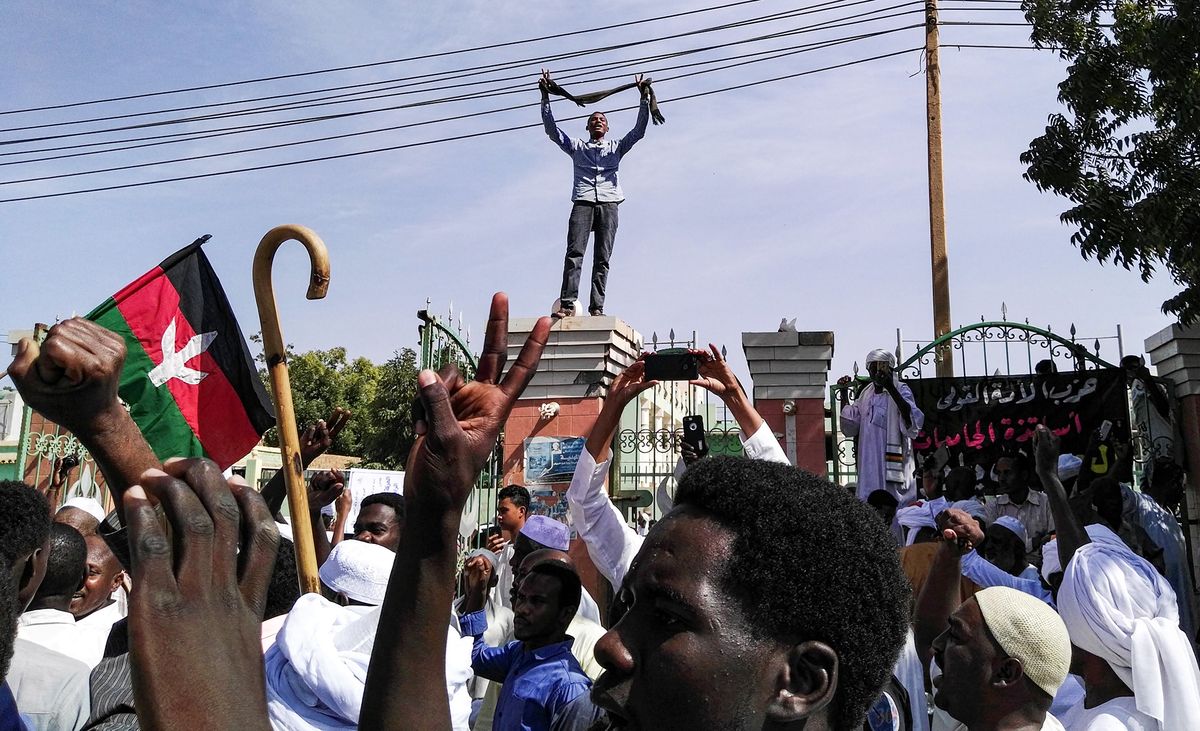The international media has simplified the reasons behind the current uprising in Sudan, citing rising costs of bread and fuel as the the ignition for the intense protests. Adhieu Majok discusses the vast historical context for the clashes and the dilemma for those heralding from South Sudan as they support the uprisings in the north.
This year marks President Omar al-Bashir’s 30-year reign of Sudan, and Sudanese citizens have taken to the streets in country-wide protests, which began on December 19th 2018. The protests, which started in the town of Atbara, have been marked by an internet shut down, electricity shut downs, extrajudicial killings, clampdowns and arrests. Despite the intense response by the Sudanese authorities, day in and day out, protesters have managed to maintain a momentum, characterised by well-coordinated and organised protests. Amidst the challenges in the uprising, Sudanese citizens have consistently showed resilience, creativity and determination, in expressing their grievances, and with the hope of ousting their authoritarian leader.
The protests, which al-Bashir accused of being reminiscent of the Arab Spring, is one of many uprisings in the history of the nation. They have been fuelled by grievances such as corruption, austerity, lack of freedom of speech, and unemployment. Sudan’s first resistance was in 1964, when the country’s military regime (headed by General Ibrahim Abboud), was overthrown in the ‘October Revolution.’ In 1985, the Intifada (in English, an uprising or rebellion) took place, in which the country’s second military dictator, Gaafar Nimeiry, was overthrown. In 1989, Bashir, backed by the National Islamic Front (headed by the late Hassan al-Turabi), staged a coup d’état against Prime Minister Sadiq al-Mahdi. So to Sudanese people this is nothing new in some respects.
Bashir’s legacy is marred with an intention to impose one cultural and religious belief system in Sudan, leading to the declaration of ‘jihad’ against the black African Christian south, and a bloody civil war in southern Sudan, Darfur, Kordofan and Blue Nile States. Sporadic protests were held throughout 2011 until 2013. They resulted in the same response from the Sudanese government: killings of protestors, internet shutdowns, clampdowns and arrests.
Initially, the international media simplified the reasons behind the current uprising (ignoring the vast historical context of Sudan), citing rising costs of bread and fuel, as the the ignition for the intense protests. Whilst a shortage of bread did indeed spark the protests in Atbara, there is a far wider issue at hand. As Sudanese narratives began to take root through social media and the mainstream Western media, the deep-rooted issues of the causes of the uprising, were eventually laid bare; Bashir’s 30-year rule, had waged injustice on the Sudanese people. Bashir’s inner circle had amassed immense wealth, whereas areas outside of the Sudanese capital Khartoum suffered from continuous underdevelopment. The lack of freedom, has seen the control of opinion and religion. The economical strain on Sudan caused rising prices of commodity, a lack of hard currency (US dollars) as well as long queues at cash machines and fuel stations.
The history of Sudan and South Sudan is complex, characterised by ethnic and religious differences, which splits the north and south into an Arabised north and a Christian south. These differences, manipulated by the Anglo-Egyptian rule of Sudan prior to independence in 1956, saw the north, treated more favourably than the south. After independence, the Sudanese government continued the colonial Southern Policy, which deliberately withheld development in the southern Sudan regions of Bahr el Ghazal, Equatoria and Upper Nile. The blocking of southern Sudan’s chance to self-determinate ignited two civil wars in Sudan: in 1955 and 1983. The Second Civil War of Sudan ended in 2005, and South Sudan, ultimately gained its independence in 2011.

The Sudanese economy is primarily based on crude oil, and went into financial crisis when the south seceded. This resulted in 75% of oil reserves seceeding with it. In addition, the 2013 civil war within South Sudan saw the long shutdown of the oil fields, and caused austerity in both nations. Predictably, after 5 years of war in the South, Bashir and his Ugandan counterpart Yoweri Museveni, brokered the South Sudan peace deal.
The response to the uprising by South Sudanese on social media, has been mixed. Some South Sudanese have remained silent, with some condemning the uprising. I, along with others, backed the uprising. The probable reasons behind the silence or condemnation of the uprising does not surprise me; Bashir is partly responsible for the latest peace agreement in South Sudan, and any instability in Sudan can put the peace agreement at risk. Predictably, the South Sudanese government has been standing with Bashir, showing just how dependent South Sudan and Sudan are on one another.
Despite being a South Sudanese woman born and raised in the diaspora, I am still closely tied to both nations. Despite my backing of the uprising, I was disappointed with some of the reasons behind the uprising. Let me explain. I remember the long suffering of the Sudanese in southern Sudan, Darfur, Kordofan and Blue Nile states. I remember that the suffering did not ignite widespread protests against the Sudanese government. The war that the Sudanese government waged on the Sudanese should have triggered immense outrage in the country, both north and south. The government left around 2 million people dead during the Second Civil War, yet again that did not ignite intense protests. Ironically, the many South Sudanese standing with the Sudanese in today’s uprising have experienced the horrors of the war Bashir raged whilst Sudanese in the north, remained silent. This is not to say that Sudanese do not have a legitimate reason to speak out against the status quo. I just have a long memory.
Today’s uprising has prompted an exploration of a possible reunification between Sudan and South Sudan, particularly on social media. While special ties between Sudan and South Sudan will always remain, I am personally content with independence, even despite the challenges South Sudan faces. Ever since the 1956 independence, successive governments of Sudan have failed to show their ability to unite the country and accept the ethnic and religious differences.
As the clashes rage on, the uprising matters. Not just to Sudanese, but also to South Sudanese, who know what it is like to live under authoritarian rule. This uprising, with its length and intensity, shows just how aggrieved Sudanese are with Bashir’s rule. Only time will tell the outcome, but for now, Bashir and his government, remain shaken and desperate to maintain control.
Source: Media Diversifiedr
*The views of the above article are those of the author and do not necessarily reflect the views of Africa Speaks 4 Africa or its editorial team.




